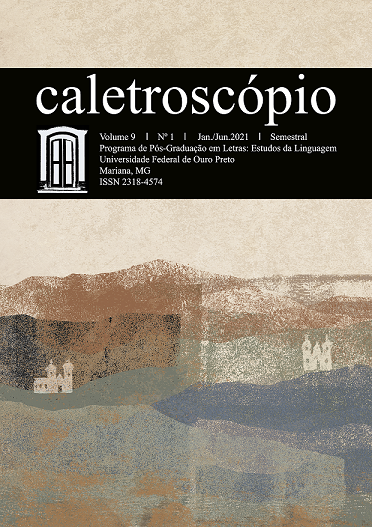A representação do medo no romance Warum das Kind in der Polenta kocht de Aglaja Veteranyi
Abstract
O romance Por que a criança cozinha na polenta, escrito em alemão por Aglaya Veteranyi, foi publicado em 1999. Nesse texto, a autora cria um universo ficcional no qual uma criança, cujos pais fogem do seu país de origem, tenta captar experiências do medo. Para a finalidade deste artigo, medo é entendido como experiência afetiva que identifica ameaças, reagindo de modo a que o indivíduo possa recuperar o controle físico, perceptivo e existencial por meio de narrativas estabilizantes que simbolizam a realidade. Com isso em mente, este artigo deseja discutir a representação do medo em três situações: no círculo familiar, no entorno social e no pertencimento existencial. Nos três círculos, a protagonista é confrontada com experiências de desestabilização, forçando-a a criar estratégias narrativas forjadas para atenuar o medo.
Downloads
References
EIBL, Karl. Epistemologie der Angst. In: KOCH, Lars (ed.). Angst. Ein interdisziplinäres Handbuch. Stuttgart e Weimar: Verlag J. B. Metzler, 2013, p. 5-140.
HÜLSHOFF, Thomas. Emotionen. München e Basel: Ernst Reinhardt Verlag, 2006.
KOCH, Lars. Einleitung: Angst als Gegenstand kulturwissenschaftlicher Forschung. In: KOCH, Lars (ed.). Angst. Ein interdisziplinäres Handbuch. Stuttgart e Weimar: Verlag J. B. Metzler, 2013, p. 1-4.
MATHIAS, Dionei; MÜLLER, Juliana Cássia. Pureza e violência: imagens da infância em A. Veteranyi. In: Literatura e Autoritarismo, v. 35, 2020, p. 83-94.
SEHLEN, Silke von. Poetiken kindlichen Erzählens: inszenierte Kinder-Erzähler im Gegenwartsroman aus komparatistischer Perspektive. Würzburg: Königshausen & Neumann, 2015.
TenHOUTEN, Warren D. A General Theory of Emotions and Social Life. New York: Routledge, 2009.
VETERANYI, Aglaja. Por que a criança cozinha na polenta. Tradução de Fabiana Macchi. São Paula: DBA Artes Gráficas, 2004.
VETERANYI, Aglaja. Warum das Kind in der Polenta kocht. München: Deutscher Taschenbuch Verlag, 2008.
VOSS, Christiane. Narrative Emotionen: eine Untersuchung über Möglichkeiten und
Grenzen philosophischer Emotionstheorien. Berlin: de Gruyter, 2004.
The publication Caletroscopio shall retain for a period of three years all authorial rights for works accepted for publication: articles, reviews, translations, etc. Outside this restriction, these works are licenced through Licença Creative Commons-Atribuição-NãoComercial-SemDerivações 4.0 Internacional.
Upon expiry of this period, in the event that the author publishes the text, even when making alterations to the original, we would ask authors to include as a footnote, the information that a previous version of the article was published in the Revista Caletroscópio, citing the appropriate references.


